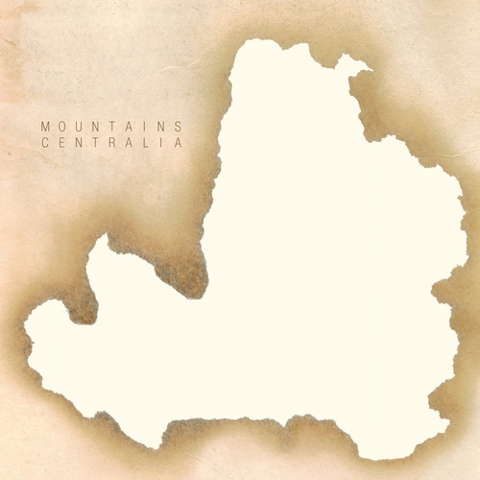The seventh album by the Brooklyn duo of Koen Holtcamp and Brendon Anderegg, Mountains’ Centralia is a meditative aid par excellence, and a musical work of understated but carefully constructed beauty. More than just background music or mood enhancer, it retains a solid, self-sufficient dignity that other "ambient" music often lacks; there is nothing apologetic, fawning, fuzzy or half-arsed about Mountains. They stand as tall and implacable as their name suggests.
Centralia‘s opener, the eleven-and-a-half minute ‘Sand’, is also appropriately named, for the way it drifts gradually into the crevices of your consciousness, all the while shimmering and reflecting as though beneath the harsh, pitiless glare of a desert sun. It’s an electronically-rendered facsimile of a half-tab sparkle on the first day of summer; a timestretched afternoon, soft focus daydreaming with just a hint of unease creeping in around the edges, a sense of Too Much trying to get in and all shade and shelter melted away. It’s at this point, though, that the track takes a turn for the classically pastoral, as sonorous cello dirges in at around the nine minute mark, bringing both balance and beauty with it.
This dialogue between organic and electronic instrumentation is the central theme of Centralia. The two strands were recorded entirely separately during the album’s long gestation – thus, the acoustic guitar, piano and strings featured here remain untreated and "pure", while the synthesisers and digital instruments are likewise uncontaminated by natural, vibration-derived sound. The results were then laid down in layers, and mixed in such a way that they constantly weave around each other, a continuous fractal pattern of shifting priorities where neither remains dominant for long.
The rolling guitar arpeggios of ‘Identical Ship’ frame an undulating synth drone that rises and falls before giving way to the slow shimmer of electronic raindrops on ‘Circular C’ – surely a nod to Terry Riley’s In C. Riley’s work looms large as an influence on Centralia, although here the early 90s "ambient techno" of the Planet Dog / Feed Your Head compilations and associated acts like Steve Hillage’s System 7 comes to mind, as well as the strung out kraut-funk of Julian Cope and Donald Ross Skinner’s contemporary Rite LP. The steady rhythm of piano and acoustic guitar is felt and occasionally glimpsed beneath the current of spangled synthesiser waves like the ruins of a submerged city, as seen beneath the shadow of a low-flying seaplane.
‘Tilt’ is another neo-folk guitar piece that allows itself to be gradually taken over by a pitch-bending synthesiser lead line, dancing around an insistent, edgy, three minor-chord motif. The track settles gradually towards silence, a moment’s pause before the album’s monumental centrepiece, the twenty-odd minutes of ‘Propeller.’ Yet vast as it is, the track remains ungraspable, an expanding or collapsing galactic nebula rendered in pulses and static, and the song of the archetypal space whale we all know is in orbit around our solar system. Recorded live and then mixed with additional overdubs in the studio, the piece builds gradually to reveal its unearthly beauty, filling the night sky with winking stars and slow-burning vapour trails.
There’s a token yet thrilling nod towards rock music as the hypnotic Rainbows-in-Curved-Air of ‘Liana’ culminate after nearly six minutes in a crashing fuzz guitar chord, followed by another, then another – each a windmilling arm apart, prompting anticipation that Mountains are about to go all ‘Baba O’Riley’ on us. But perhaps realising that said Who song peaked with its Lowrey Berkshire Deluxe TBO-1 organ-led intro anyway, the duo withdraw back into the moody minimalism of ‘Living Lens’ to close.
Centralia is an album of surprising, subtle depths, a spacious, psychedelic landscape where the traditional meets the modern in a dreamlike combination of familiarity and strangeness. Differently packaged, many of the sounds on this album would not seem out of place on the fashionable and critically acclaimed Ghost Box label; hopefully this too will find an appreciative, discerning audience.


